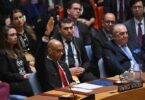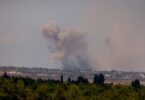Artem Shraibman
The more efforts Lu-kashenka invests in his international to-xicity, the more important it becomes for the West to show that pressure on the Belarusian regime leads to some tangible consequences. Russia is the only country that can seriously influence the behavior of the Belarusian authorities, so it is only a matter of time before the pressure on this issue is switched from Minsk to Moscow.
The Belarusian political crisis became cramped ins-ide the country, and it burst out. Having raised a fighter jet, Minsk landed a civilian plane Ryanair Athens – Vilnius on its territory, apparently with the sole purpose of arresting journalist and activist Roman Protasevich. The international isolation of Alexander Lukashenko has been growing for many months, but now it is reaching a new level. Feeling the style of Minsk’s work with opponents on its citizens and the plane, the West is taking measures that it has not dared to take for decades.
The closure of the Belarusian sky for European airlines and a ban on Belarusian aircraft to land in European countries has already been announced. In the coming weeks, new economic sanctions are expected, which, according to various sources, may hit not only businesses close to the authorities, but also the export of certain groups of Belarusian goods. Joe Biden announced that Washington will also accept new sanctions. According to Minsk, they were sent an email by “Hamas soldiers” who promised to blow up the plane over Vilnius, demanding that Israel stop shelling (two days after the ceasefire). Therefore, Belarusian dispatchers saved their ungrateful neighbors from a terrorist attack. Protasevich just ended up on board, and since he was wanted, he had to take advantage of his luck. The new quality of Minsk’s problems with the reputation underlined the fact that even Hamas condemned the Belarusian met-hods and asked not to use itself as a cover in the suppression of freedom of speech. The foreign policy of the Belarusian authorities has changed over the past year following its internal evolution. If you push your own limits of what is permissible for a long time in the fight against the opposition, the sense of proportion also disappears on the outer contour. Many people wonder if the arrest of one activist was so important? Didn’t Lukashenka expect a scandal when he gave the order to raise the fighter to land the European side? Th-is formulation of the question has little to do with the state of the Belarusian auth-orities. Most likely, Minsk really did not foresee such large-scale consequences, but it did not even look in this direction. The survival mode sharpened the tunnel vision of the Belarusian authorities. All energy is directed to one point, to neutralize enemies. Side effects, like reputation problems, are dropped from the decision-making process.
In order not to fall under the distribution, no one in the system will object to the initiators of the next act of retaliation or punishment of opponents. The mechanisms for rejecting dangerous and reckless steps simply stopped working. For the sake of justice, in the case of Ryanair, it is unclear whether there was at least some discussion of the operation and at what stage Lukashenko himself learned that the special services were preparing to land the plane with Protasevich.
The incident transferred Minsk from the category of violators of European norms to violators of European peace and security. The boycott of the Belarusian airspace by most European airlines makes the country much more toxic to any form of international cooperation than ever before.
Sports teams are already refusing to fly here for competitions. The visa-free entry, which the Belarusian authorities proudly introduced several years ago, irritating Moscow, as well as the negotiation platform in Minsk, is no longer needed.
The Belarusian capital is losing its attractiveness for transit tourists, which used to be the main source of income for the Minsk airport and the state-owned company Belavia, especially during the pandemic. The airline itself is now likely to have to be subsidized from the budget, and its staff will be seriously reduced.
Arrival in the country for still somehow interested Western investors and businessmen is now associated not only with reputational problems, but also with logistical ones. The details of the economic sanctions are still unknown in order to assess their potential damage. It is unlikely that the European Union will introduce a full trade embargo or block land transit through Belarus, but the outrage this time is much more serious than ever. A new degree of indignation is visible if only because two traditional arguments against tough sanctions are not heard: that they will push Minsk even closer to Moscow and harm ordinary Belarusians.
The air boycott will ricochet not only against the regime, but also against its opponents, who would like to leave the country. There are no such serious economic sanctions that would not harm ordinary people or force Minsk to seek alternative markets, trade routes and simply support in Russia. But the West is now more likely to defend its interests, which Minsk has stepped on, than to help the Belarusians solve their problems with the authorities. For the EU and the US, the priority now is to prevent the creation of a precedent of impunity for actions that they call state terrorism or piracy. Relations between Lukashenka and the West seem to be irreparable, no matter what happens. This atmosphere of forever burnt bridges, becoming familiar to the parties, removes the restraints in mutual pricks.
Latvian Foreign Minister Edgars Rinkevichs, once pragmatic towards Minsk, and Riga Mayor Martins Stakis demonstratively removed the Belarusian national flag from the flagpole dedicated to the World Ice Hockey Championship in the Latvian capital, and hung the protesters’ white-red-white flag there. The entire Latvian embassy is being expelled from Minsk, but this does not bother Riga too much – they put an end to Lukashenka.
Minsk is not afraid to take such anti-Western steps also because it feels Moscow’s cover. Moreover, any such provocative actions are an asset that Lukashenka uses in his conversation with Russia.
The message to Putin is that there will be no more anti-Western Belarusian leader, which means that we must hold on to this. Like all roads from the North Pole lead to the south, any change of power in Minsk in such a situation is a drift towards the Belarusian rapprochement with Europe.
It is not known to what extent Moscow is ready to cover up and financially support Lukashenka. The more expensive this alliance is, and the more often Russia is accused of complicity in the actions of Minsk that revolt the West, including the plane incident, the stronger voices displeased with Lukashenka sound in the Russian elite. Over the decades of difficult relations, a lot of them have accumulated there.
The upcoming meeting of the US and Russian Presidents is becoming an important context. For many months the Belarusian opposition could not get their issue discussed at such a level, but Lukashenka helped them solve this problem. The White House has already confirmed that the Belarusian topic will be on the agenda.
Now there is talk of a big deal, some kind of agreement on a broad de-escalation between Moscow and Washington through the exchange of concessions in different regions and disputes. This seems like a simplistic view of international politics. For such transactions, you need much more trust in the relationship, and not every dispute can be resolved over the head of those whom you are going to exchange. But the establishment of some kind of mutual understanding between the parties is possible, and then Moscow will have to think about how it is ready to soften its position in order to preserve the atmosphere of de-escalation that has not been firmly established in relations with Washington over the past month. It is humiliating for the Kremlin to concede in domestic politics, and dangerous in the Ukrainian question. Moscow seriously fears that Kiev will solve the problem of Donbass by military means if Russia weakens its presence there. But reciprocal steps in the Belarusian direction are not so difficult and risky.
This scenario does not yet look like something inevitable or even particularly probable – the US and Russia first need to agree on de-escalation, which they have not always succeeded in. But the more efforts Lukashenka invests in his international toxicity, the more important it becomes for the West to show that his pressure on the Belarusian regime leads to some tangible consequences. Russia is the only country that can seriously influence the behavior of the Belarusian authorities, so it’s a matter of time to switch pressure on this issue from Minsk to Moscow.






